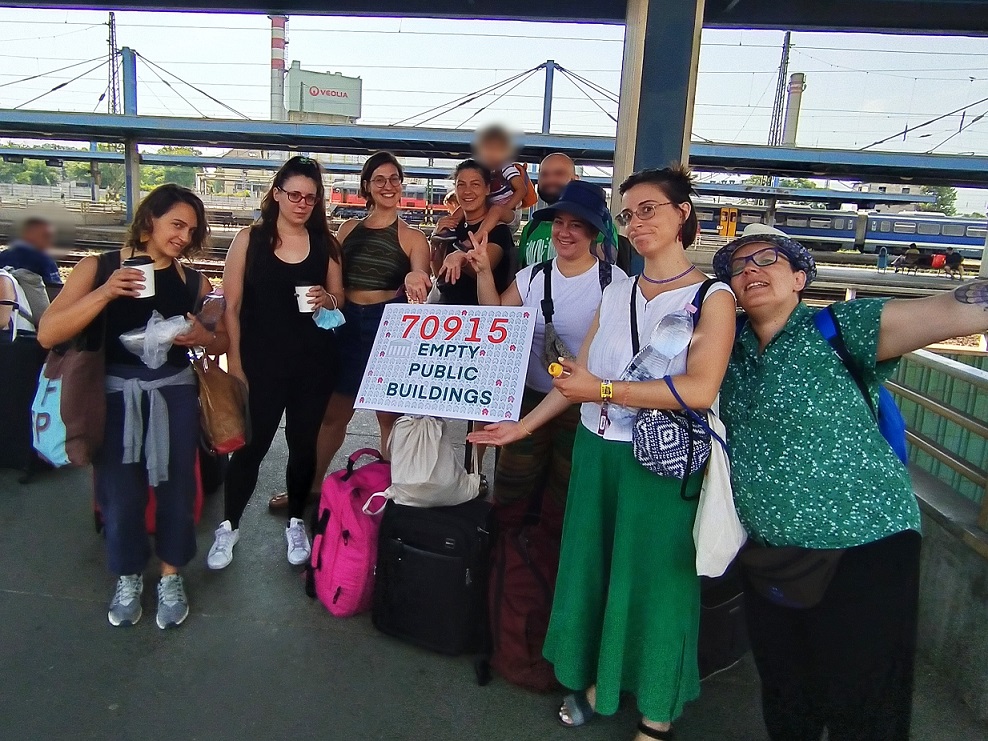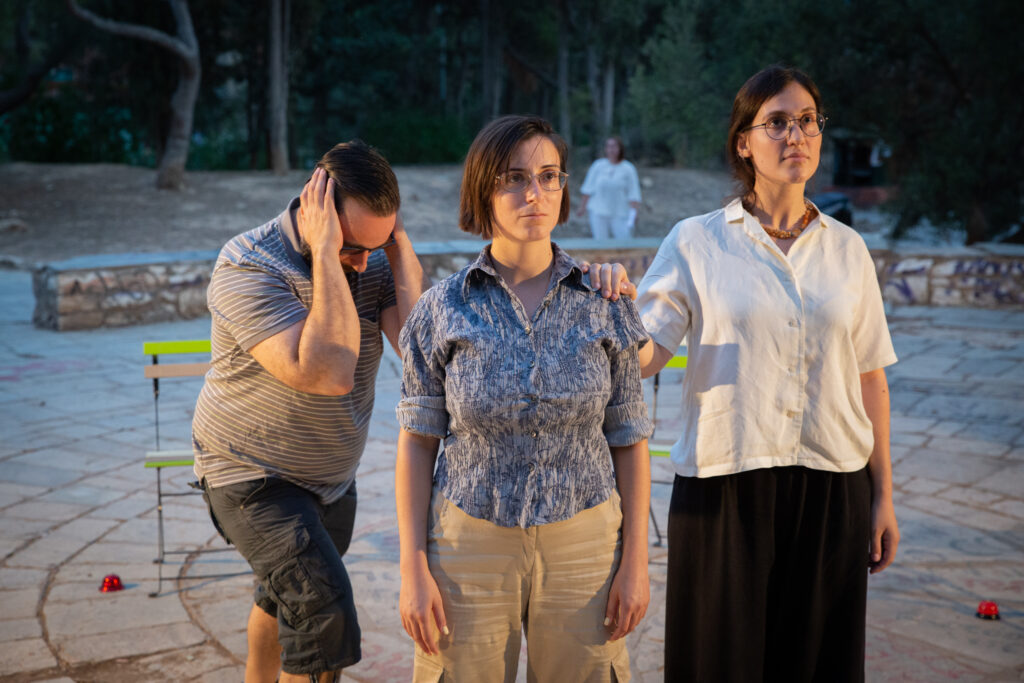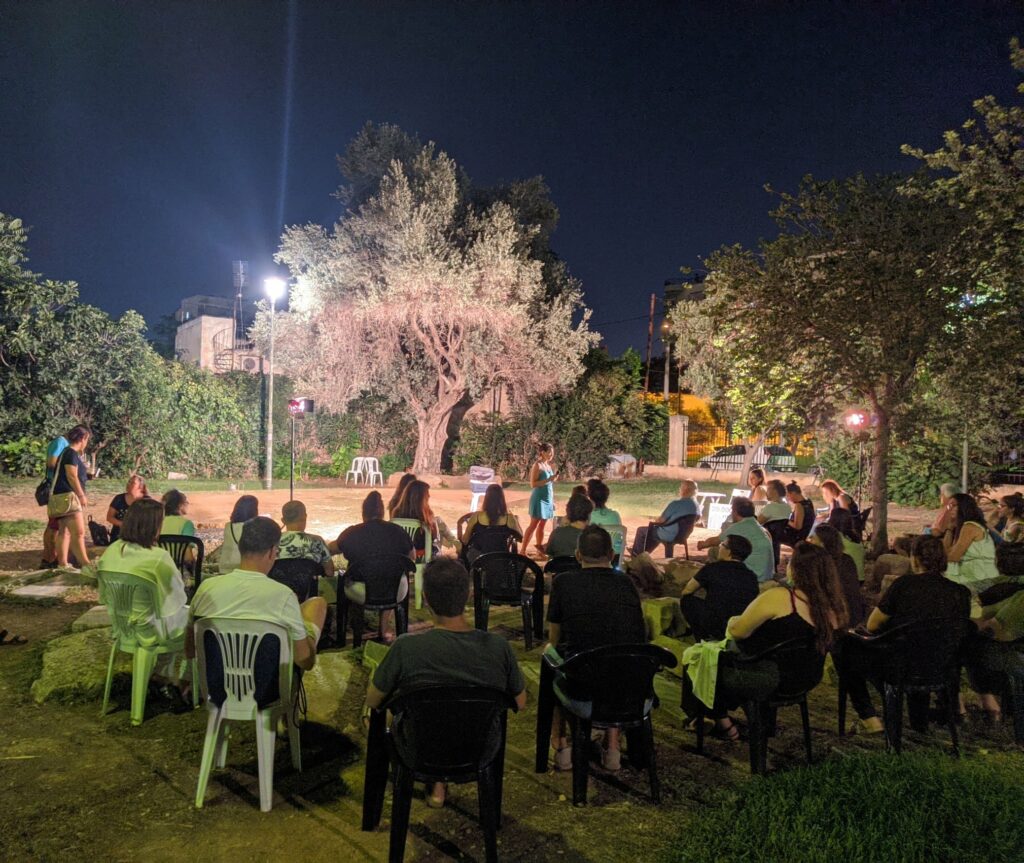
His right hand was laying at the edge of the table as he was sitting next to it. A calendar, a photo and half a cup of coffee, sprinkled across its surface. Leonidas, lost in thought for some time now, gets up in a swift move and gets packing.
First, the calendar. Then some clothes. Last, the photo. And a prompt. “Get on with it!”
“Do you hear me? Get on with it!”
And then walking determined, he breaks the fourth wall, walking among the audience, exiting from the back.
Leonidas was the main character of the play “Welcome to the vicious circle! – A play for housing precarity”. The play was written and produced by Inter Alia’s theatre group that was formed on the occasion of the Using Theatre to Make Politics project.
Ariadni Zoidi, who has been acting this part, speaks about the story that inspired the group.
“Mr. Leonidas was in a position of precarity and ended up homeless […] That’s why we [also] introduced the issue of homelessness.”

His story was presented in several media with titles such as “Life lessons from a homeless person” (newspaper “Kathimerini”, March 3rd, 2020) and “The vision of a homeless person and people’s solidarity” (newspaper “Efsyn”, March 4rd, 2019). This gave the group the necessary inspiration to develop a play, using one of the methods of “Theatre of the Oppressed”, developed by Nobel laureate Augusto Boal, Newspaper Theatre.
“In our Newspaper theatre play, the main aim was to raise awareness regarding Housing Precarity, an aim we generally achieved. People were reluctant to share their stories, though the audience included people directly affected by such situations”
As Augusto Boal was a pioneer of citizen’s consultations and tools for community assembly, the group looked to local communities to interact, raise awareness and create civic space for dialogue and action.
Newspaper Theatre: performing at Plato’s Academy for housing precarity
On July 18th, Inter Alia’s theatre group gave their last performance of “Welcome to the Vicious Circle” (“Καλώς Ήρθατε στο Φαύλο Κύκλο”) in Plato’s Academy Park in Athens. This play was the last performance in Greek, in a series of 3 performances, leaving just one more to be performed in English the following weeks.
Plato’s Academy Park is located in the north-western part of Athens municipality. It is considered a middle-lower class area, within which, during the years of the Greek economic crisis, multiple inequalities were brought out. The park is a large open, green area around the archaeological remnants of the ancient Greek Philosopher Plato’s Academy. Apart from being a meeting place mostly for the residents of the greater area, Plato’s Academy Park has been a hosting venue for many open-air, free-entrance activities. Such a welcoming background proved to be ideal for the group, as actors, staff, and friends were on site since early in the evening, long before the performance began. They took some time to rehearse, set up with the support of a nearby co-operative cafe. The performance was attended by people pre-informed on the event (therefore coming from other areas to attend), and also most notably, due to the Park’s character, it engaged many residents of the area that happened to be passing by, though not knowing even its topic beforehand. Residents of various ages attended, families with children, youngster groups and individuals, and senior people. By their own words, middle-aged and older people felt happy (and honoured) that “they could watch theatre in their neighbourhood”.

The audience was very responsive to the performance, as was highlighted during the following discussion, facilitated by Violetta Manola, acting as the Joker of the group. People were eager to participate in the conversation, answer questions, some people even being open enough to share their personal stories and troubles (triggered by the play’s final, more personal act). The data and figures incorporated in the play surprised many audience members, referring to, for example to the numbers of publicly owned, vacant buildings (one of the figures shown during the performance). It was revealed that many residents of the area happen to know people that at the time were or themselves have been in a state of housing precarity. Given the area’s middle-lower class social profile this came to some as a surprise. The audience said they were easily able to sympathise with the situations included in the play. The discussion did not just focus on the limits of the neighbouring area though, as the audience themselves agreed that the phenomena of housing precarity, homelessness and following social stigma during the last decade have spread in many areas of Greece. Most interestingly, the audience happened to include people working in fields related to housing policymaking (both top-down and bottom-up initiatives) who were eager to share their own experiences and views regarding possible solutions and (the lack of) organised state policies targeting the issues.
Later commenting on the involvement of the audience in their performances, Georgianna Psichali, commented on the potential of Boal’s methods to leave a social mark.
“If you manage to master the method of the Theatre of The Oppressed, there is great potential; you can do anything you want. There are examples and good practices from other countries, such as grassroots initiatives in France.”
Following their performance in Plato’s Academy Park, the team went on to prepare for the upcoming “Theatre of the Oppressed” festival in Debrecen, Hungary, where they would meet their counterparts from Portugal, Romania, Norway, Poland, and of course, Hungary.
The trip to Debrecen
The team’s trip to Debrecen happened to be a long one. After arriving at Budapest airport, the Greek team reached the train station, where, while waiting on the platform, the Portuguese team arrived too. The combined group waited more than expected for the train, tried unsuccessfully to communicate in Hungarian with locals in the same waiting position, finally resulting in hand signs and gestures. The train, as figured, was delayed. When it finally arrived, there was one transit stop and more delay. Though tired (and hungry), both groups were engaged in a discussion regarding the upcoming event which was to start, early in the following morning.
The “Using theatre to make Politics” festival was incorporated within the music festival “Campus fesztival 2021”, hosted annually in Nagyerdei Park, in the city of Debrecen. Debrecen is the second biggest city in Hungary, though considerably different in scale and vibe from the capital, Budapest. People talk of a more laid-back, more at ease, more walkable place. The participant theatre teams were hosted at the premises of the University of Debrecen – Debreceni Egyetem , at walking distance from the Nagyerdő water tower (“Nagyerdei Víztorony”), the venue of “Using theatre to make Politics” festival activities. Built in 1913, Debrecen’s Nagyerdő water tower has been renovated, and currently serves new functions, including the use of its ground floor for exhibitions, concerts, and art presentations, thus making the venue appropriate for the “Using theatre to make Politics” festival.
The hosting Hungarian team had created a welcoming and safe in terms of health protocols environment for the whole group, a dynamic strengthened by every team’s eagerness to interact, respect, and share. During the four days of the “Using theatre to make Politics” festival, the theatre groups had the opportunity to participate in non-formal educational activities, workshops and energizers, share knowledge through Theatre performances and discussions following. The days of the festival, from the morning until early in the evening were full and intense, yet rather fulfilling in terms of experience and interchange.
Performing together for social change
The group’s theatre performances and activities were organised among the different days of the Festival. Two theatre performances took place during the first day (21/07/2021). The first performance was “Baby Boom-Magyarorzag” by the hosting Hungarian group, in the format of Newspaper Theatre. The play included a wide range of interesting and triggering topics, from pressures of society regarding traditional family values and childbirth, to the vast and often uncontrollable spread of rumours and their impact on involved parties. The themes were approached with care by the performing group, who managed to also insert an element of humour. It was a great warm-up for the whole group, as everyone participated lively in the following Joker discussion.
Later that same day (21/07/2021), the performance of the Portuguese team “What if I could change the world?” took place. Using Legislative Theatre, the play raised broader issues of Environmental Concerns and lack of awareness regarding environmental dangers, as well as negligence on respecting the law. Sensitive, complex topics were approached in a comprehensible and audience-friendly way by the Portuguese team (we were also informed that the play has previously been presented and targeted also to younger/school audiences) which allowed the participants to engage in discussions a different thematic compared to the previous performance, highlighting similarities and differences among the different countries/experiences of each participant.
During the second day (22/07/2021) the Romanian and Polish groups’ performances took place. Both plays happened to target similar issues, namely patriarchy and violence against women, though presented in two completely different performances in style and interpretation. This fact gave the participants the opportunity for a deep, evolving discussion during the day, as the themes were brought up by different backgrounds, yet highlighted the surprising similarities among different countries. The performance “What if…” by the group coming from Romania, using Newspaper theatre, was presented in the morning. Utilizing the set of talk shows split into two different countries (Romania and Spain), the play managed to reveal similarities between the Romanian and Spanish cases, regarding violence against women, how society views such incidents and how the media project idealised and fake views of troubling realities. The following performance, during the same day (22/07/2021) was from the Polish group, “Zapatos Rojos-Lengyelosrszag” in the format of Newspaper Theatre. Using a more subtractive and artistic format, the Polish play triggered the emotions of the whole group presenting how disturbingly often relationships that include domestic abuse can be long lasting, traumatising for more than one party (women and their children), ignored by society and therefore resulting to tragedies.
In the afternoon of the 3rd day (23/07/2021), the Greek group performed “Welcome to the Vicious Circle”, set up as a Newspaper Theatre play. In a setting of a TV game show, the Greek play focused on the broader topic of housing precarity in modern post-crisis Greece and its potential externalities (such as homelessness, social stigma and prejudice, policies -or lack thereof- of the Greek State regarding such issues). The play highlighted the domestic context, incorporating also references in specific data and figures related to the issue; yet this not only did not alienate the audience but, as, during the previous performances, similarities between Greece and other countries were brought to light. Good practices and practical solutions were also mentioned. It should be noted though that much of the audience response was focused mostly on the topic of homelessness as a result of housing precarity.
The last two performances took place on the 4th and final day of the “Using theatre to make Politics” festival (24/07/2021). In the morning, the hosting Hungarian group performed their second play “This Is Not What I Wanted” in the format of Newspaper Theatre. The play was written as a talk show, engaging actors sitting with the audience, to highlight different social perceptions, polarising ideologies, media projections in the broader topic of family relations and dynamics between different sexes and generations. The festival audience response was interesting, as, similarly to the actors, various responses were articulated and different perceptions were revealed.
The last play to be presented was the one by the Norwegian team, titled “Travel on the fjords”. The play, due to travel restrictions between Norway and Hungary, was shown as a pre-recorded performance in Norwegian with English subtitles. Despite the absence of a live performance, the play’s topic, as well as the young students’ performances, captivated the festival audience which engaged in an interesting discussion, sharing similar experiences from different countries and proposing solutions.
Most of the groups had already finished performing their plays back home. It should be noted, though, that most of the plays had not been performed in English before arriving in Hungary. Despite this challenge, every group proved to be successful both in translating the play from the source material and in performing, highlighting also the versatility of theatre of the oppressed method. Also, as already mentioned, each of the plays performed proved to “speak” in more than one context and concern people from multiple backgrounds, as proven by the engagement of the audience in the Joker discussions. It was also discussed that, should there have been a closer interaction of the “Using theatre to make Politics” festival with attendees of “Campus fesztival 2021”, broader feedback on the performances’ impact could possibly be received.
Epilogue
As Panagiota Stathakou, a member of the theatre team said, “There’s much potential in the connection of Boal’s method with other techniques, of theatre and coordination”.
The play “Welcome to the Vicious Circle” and the festival at Debrecen were the concluding part of a 2-years long effort to bring the Theatre of the Oppressed to local communities, empower practitioners for resilient support of community change and structured social advocacy. The whole group deems possible that their efforts will carry on, after this empowering experience, expressing ideas of building on what they learned. We are sure this conviction will be echoed by actions to come.
Members of Inter Alia’s theatre group are: Eleni Vantana, Ariadni Zoidi, Marianthi Karadima, Dimitris Katsidoniotis, Gialena Kleidara, Veroniki Krikoni, Violeta Manola, Panagiota Stathakou, Aggeliki Tranta, Georgianna Psichali, Boyka Boneva.
To learn more about “Using Theatre to Make Politics”, other plays within the project and the educational material produced, see here or contact Veroniki Krikoni or Boyka Boneva.
Article by Myrto Galani, Alexandros Vakoulas




